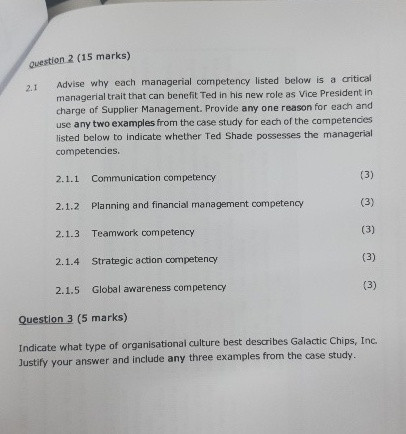Answered step by step
Verified Expert Solution
Question
1 Approved Answer
SECTION B ( 4 5 MARKS ) - CASE STUDIES Read the below case study and answer the questions that follow: The case of Ted
SECTION B MARKS CASE STUDIES
Read the below case study and answer the questions that follow:
The case of Ted Shade
Ted Shade is the Vice President of Supplier Management at GalacticChips, Inc. Supplier Management is an important segment of the manufacturing organisation, and is responsible for supplier negotiations and monitoring the parts supply that are so critical to effective manufacturing. Recently, Ted Shade described his leadership style with these words:
I have an opendoor policy. If a person has an issue, they can aiways come in and see me; they don't have to go through channels.
Still, David Ming, Senior Vice President of Operations, considers Ted's operation, which reports to him, a problem. "I don't know what to do with Ted"
he said, when he discussed Ted with Alex Donovan, the Vice President of Human Resources.
Company background
Located in the New York metropolitan area, Galactic Chips, Inc. is a small manufacturer of microchips for diverse specialty products, such as personal computers PCs printers, fax machines, telephones and submarines, It has grown rapidly since it was formed in the early s by Patrick Rivers.
From the beginning, Rivers' vision was to create and maintain an organisational commitment to satisfying customer needs, staying on the cutting edge of technology, and fostering mutual respect among and between employees. Under his leadership, the company grew to a comfortable $ million in annual revenues over a year period, before he relinquished CEO responsibilities to a new, externally recruited executive because he wanted to spend more time with his family and felt that "new blood" should take over to further grow the business. Rivers remained Chair of the Board of Trustees.
The new CEO's leadership style was rather autocratic and, thus, drastically different from Rivers' much more partiopative approach. Morale plummeted and, over the next three years, Rivers regularly heard complaints from employees. Revenues and profits also dropped, gradually at first and then more briskly. Galactic was no longer keeping pace with the swiftly changing dynamics of the chip industry.
The board strongly requested that Rivers return as CEO, and he accepted this new challenge.
Organisational assessment
Rivers, as a returning CEO asked the respective vice presidents for assessments of the market strategy and opportunities, product comparisons with those of competitors, and operations effectiveness. From Alex Donovan, he requested an analysis of morale, attitudes and culture.
Donovan immediately pointed out that many managers needed to hone their interpersonal skills. He recommended coaching and counselling by an industrial psychologist for managers who wanted such assistance and suggested that some managers should be urged, possibly strongly, to
participate, One of these was Ted Shade, the Vice President of Supplier Management, whom David Ming, Senior Vice President of Operations considered a "problem".
Shade's background
Ted Shade is a yearold white male, who was born and raised in Abilene, Texas. Shade managed to complete both his undergraduate programme and a Master's degree in Chemistry at Virginia Polytechnic Institute. Following this, Shade served as a Second Lieutenant for three years in the US Army; he was an environmental and chemical supervisor of nerve gas. He pointed out:
I Whe my work ethic and my Texas heritage
After leaving the military, he went to work for Texas Instruments as a production supervisor. Shade was in charge of operators who primarily made silicon wafer chips. "Texas Instruments was a burnout company, he pointed out.
Shade left Texas Instruments and took a position as a wafer fabrication manager at Galactic Chips, Inc. He was impressed with his first boss, though he was not well organised and a "shouter" who berated subordinates even for small errors got things done, "Shade remarked. At that time, Galactic was riding the crest of the PC wave; orders were coming in faster than it seemed that they could be met. Still, somehow, they were, despite the fact that most departments appeared to Shade to be very laid back.
Galactic was also under a great deal of pressure to get newly designed chips out to the customer. They were also beginning to have some quality problems and needed to deal with the resulting customer concerns. As David Ming saw it Shade was always there. He helped get the chips manufactured and met the customers' deadlines. He also helped in resolving the customer complaints.
Shade would show up early in the morning before the third shift left to get feedback from the night's production, and he would stay very late at night to help the production supervisors on the second shift, working most Saturdays, and when needed even Sundays. Ming remembered that people used to joke at the time about Ted being married to a saint since he ha

Step by Step Solution
There are 3 Steps involved in it
Step: 1

Get Instant Access to Expert-Tailored Solutions
See step-by-step solutions with expert insights and AI powered tools for academic success
Step: 2

Step: 3

Ace Your Homework with AI
Get the answers you need in no time with our AI-driven, step-by-step assistance
Get Started


